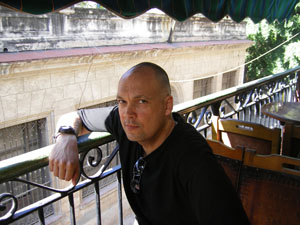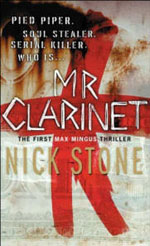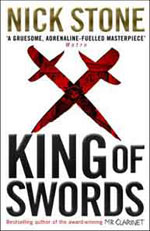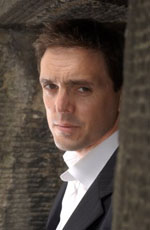- Welcome
- Noir Zine
- Allan Guthrie
- Books
"...those who enjoy the darker side of the genre are in for some serious thrills with this..."
Laura Wilson, The Guardian

Published in the UK by Polygon (March 19th, '09) and in the US by Houghton Mifflin Harcourt (Nov '09).
NICK stone
by Tony Black
 London-based Nick Stone (pictured right) is a multi-award-winning author of the acclaimed novels, Mr Clarinet and King of Swords. He talks to Tony Black about his writing influences, previous lives as a dish-washer and boxer, and, why he just doesn't get Twitter.
London-based Nick Stone (pictured right) is a multi-award-winning author of the acclaimed novels, Mr Clarinet and King of Swords. He talks to Tony Black about his writing influences, previous lives as a dish-washer and boxer, and, why he just doesn't get Twitter.
TONY BLACK: Your first book, Mr Clarinet, was an instant bestseller and picked up just about every award going – quite a launch pad…
NICK STONE: Its success took me by surprise. Totally. I wasn’t expecting it. I’d hoped it would do well enough to keep me open for business, but I hadn’t anticipated anything beyond that. And, being half Glaswegian and half Haitian, I knew better than to hope for little more than the sun coming up the next morning.
TB: Would you have preferred a slower build – I presume the expectations for book two, King of Swords, were immense?
NS: I was fine with the build, just fine with it.
As for the expectations with King of Swords, I wasn’t aware of any. It was just me in my room, writing a book. Still is.
TB: What can you tell us about your next novel?
NS: It’s a sequel to both Mr Clarinet and King of Swords. It’s set in Miami and Cuba in 2008. As I’m still writing it, I’ll stop there. Oh, except to say it’s out in 2010.
TB: Did you always want to write thrillers? (Might we see something else from you one day?)
NS: Not initially. I started writing in earnest around the age of 15. I wanted to be a literary writer, I suppose, although there was a noirish bent to everything I did.
It was only when I read James Ellroy’s The Black Dahlia in 1993, that everything coalesced. That book was a wake up call, as seismic to me as seeing The Ramones or the Sex Pistols for the first time must have been to barely competent musicians or even non-musicians in 1975 and 1976. Ellroy shattered my every ignorant prejudice about crime fiction (which I knew little about at the time) – that the characters were Manichean archetypes, that the prose was by the numbers, that there was a happy ending. Ellroy’s books were dark and messy; the “heroes” were repugnant, racist, unbalanced, their motives selfish or criminal; the villains were the same as the guys who were chasing them, only they’d tipped all the way over. And then there was the writing itself, which was like nothing I’d ever read, let alone imagined possible in the late 20th Century. You know, I’d read Ulysses and Tristram Shandy and Burroughs, and I didn’t think there was too much left to be done with the English sentence. Ellroy proved me wrong. Totally and utterly wrong. And he continues to do so. His latest novel, Blood’s A Rover, is a masterpiece.
That said, I didn’t have a lightbulb moment and think “I can do that” when I read Ellroy. I thought “I should do something like that”. But it took a while to come. I didn’t really have much to write about. I didn’t want to write a boxing book (and I’m glad I never attempted to, because FX Toole’s two books are the best boxing fiction you’ll ever read). Then I read about a society kid being kidnapped in Haiti and saw his picture - really haunting. They never found the kid either.
 The germ of the idea for Mr Clarinet came to me in Haiti in 1996. I started writing a book called that in 1998. It started roughly the way King of Swords does, with a body in a primate zoo.
The germ of the idea for Mr Clarinet came to me in Haiti in 1996. I started writing a book called that in 1998. It started roughly the way King of Swords does, with a body in a primate zoo.
As for something different, you never know and you never can tell. I’ve currently got no plans to write outside the crime/thriller genre. And I’ve got a fairly good idea what my next four books are going to be about. Beyond that, we’ll see.
TB: Pounding keys to print … long or short route?
NS: What’s 38 minus 18 in years?
TB: How did you come to writing? What kind of work did you do in the real world?
NS: I had a lot of jobs. The best was washing dishes at Sainsburys staff canteen. Great atmosphere, really great people. I was their fastest dishwasher ever, don’t you know? And I didn’t break anything either, which turned out to be a record. When I left they gave me a pen and an engraved plastic plate, both of which I’ve still got. The second best was paralegal work at the Old Bailey – murder trials. Seeing the process up close like that, and going through every stage of a trial with young people, barely out of their teens, facing 15 to 30 years in prison is an eye-popping experience. I also visited a few prisons too. Grim. I hated the other jobs I had and the feeling was mutual. The last one I had – as a headhunter – was probably the worst. I couldn’t see any tangible result or benefit in what I was doing, except that my bosses could buy more cars, houses and horses (not a typo). You know, Tony, maybe I should have been a plumber. That’s a decent profession.
TB: It’s a little-known fact - but you’re a Scotsman, Weegie to be precise …
NS: I’m an honorary Scotsman. My dad’s originally from Glasgow. Grew up on the edge of the Gorbals during the war, so he’s tough. My grandmother, Mary Stone, was as tough as old boots too. She used to take me to her local pub, the same one she’d been going to for thirty years. There were all these pictures of local bareknuckle boxers on the walls, because they used to hold fights in the basement. That was where I first tried whisky. I didn’t like it, mind, still don’t. Good place, Glasgow. The people are very accepting and open-minded. Great outlook on life too. I used to love going up there as a kid, in the 70s.
TB: Those that read your blog will know your knowledge of boxing is extensive – but you were also a bit of a contender back in the day . . .
NS: What, you read it? I actually feel sorry for people who go to my blog expecting some kind of insight into writing or what I’m up to. All they got last month was boxing and The Specials.
I have started interviewing writers I admire on the blog though. And I’ll be writing a little more about books I like, writers who’ve influenced me, etc, etc.
It’s a sport I absolutely love, boxing, the only one I have any interest in.
 I was an amateur boxer. I wasn’t particularly good at it, truth be told. But I was blessed with a brilliant trainer, who I always listened to. He identified my core weakness (a weak left) and worked around it. I fought southpaw when I was actually orthodox. Started out as a welterweight and ended as a middleweight with cracked ribs. Actually, I’m pretty fucked up physically. All kinds of damage. I’ve broken all but my thumbs several times over, so my hands seize up in the cold. I’ve had my jaw broken twice, which was VERY painful. I’ve had my nose busted once, which hurts initially and then feel likes a bad cold. And I’ve got a dent in my right temple which has since affected my eyesight. Of course, I’d do it all again in a heartbeat, but I wouldn’t let my kids do it.
I was an amateur boxer. I wasn’t particularly good at it, truth be told. But I was blessed with a brilliant trainer, who I always listened to. He identified my core weakness (a weak left) and worked around it. I fought southpaw when I was actually orthodox. Started out as a welterweight and ended as a middleweight with cracked ribs. Actually, I’m pretty fucked up physically. All kinds of damage. I’ve broken all but my thumbs several times over, so my hands seize up in the cold. I’ve had my jaw broken twice, which was VERY painful. I’ve had my nose busted once, which hurts initially and then feel likes a bad cold. And I’ve got a dent in my right temple which has since affected my eyesight. Of course, I’d do it all again in a heartbeat, but I wouldn’t let my kids do it.
While we’re on the subject of the internet, the thing I really don’t get is fucking Twitter. I mean, who in the hell a). posts what they’re doing every minute of every day and b). what sad tosser reads it?
TB: Haiti, Miami - the setting itself is a character in your work…Another acclaimed thriller writer, Graham Greene, liked his exotic locations … you a fan? (And who else has been an influence on you?)
NS: Yes, I’m a big fan, but I don’t think of Greene as a thriller writer though. He wrote all sorts of books. He famously divided them between “novels” (The Power & the Glory) and “entertainments” (comparatively lighter fare like Our Man in Havana). He was beholden to the thriller genre though. You can tell that in the pacing. One of his favourite books was Eric Ambler’s A Coffin for Demetrios (generally acknowledged to be the first modern thriller – which also went on to influence everyone from Ian Fleming to John Fowles). That had a huge influence on him.
I consider Greene to be a literary writer who wrote a few thrillers. A Gun For Sale and Brighton Rock are, for me, the best British thrillers ever written.
TB: What about your writing routine – structured or chaotic?
NS: Fairly structured, but ever changing.
I worked office hours for Mr Clarinet. I’d just left a white collar job at the time, so I was very used to being at a computer from 8.30 AM to 6.00 PM. I’d take short breaks and go back to work.
King of Swords was an early morning book, written between 4.00 AM and maybe 12.00 PM.
This one I’m writing in the afternoons and at night, well into the early hours. I no longer have a social life. My wife occasionally lets me out to see The Specials. Do you think I should Twitter?
TB: Each new book is like setting out to climb Everest – from a different route, discuss …
NS: It’s hard work. But it’s rewarding too. Very very rewarding. There’s nothing like knowing you’ve written something good. I had that with King of Swords, you know, this weird feeling of bliss and contentment.
TB: Nick, thanks for the words.
NS: Thanks a bundle for talking to me, Tony. It's been a thrill.
###
Copyright (c) Noir Originals, 2009
Turning the tables: Nick Stone interviews Tony Black
TONY BLACK was born in Australia and grew up in Scotland and Ireland. Based in Edinburgh, he is an award-winning journalist, editor and novelist. His journalism has appeared in the UK national press and his short fiction in a variety of publications on the internet and in print. His first novel, Paying For It, features hack turned investigator Gus Dury, and the second in the series, Gutted, is out now.

